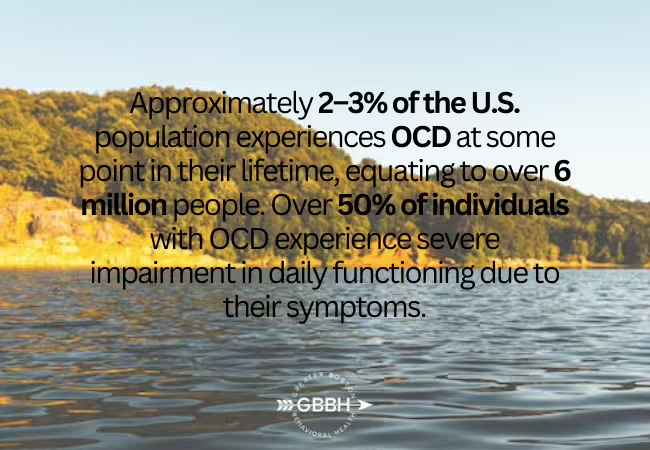Obsessive-Compulsive Disorder (OCD) is a chronic mental health condition characterized by unwanted, intrusive thoughts (obsessions) and repetitive behaviors or mental acts (compulsions). The nature of OCD can lead to significant distress and impairment in daily functioning. Fortunately, Exposure and Response Prevention (ERP) is a proven and effective treatment strategy for managing OCD. At Greater Boston Behavioral Health, we provide specialized mental health treatment programs to help individuals overcome their OCD through targeted therapies like Cognitive-behavioral therapy (CBT) and Dialectical behavior therapy (DBT).
What is Exposure and Response Prevention (ERP)?
Exposure and Response Prevention (ERP) is a type of Cognitive-behavioral therapy (CBT) that has been widely recognized as the most effective treatment for OCD. ERP is designed to help individuals confront their fears directly and learn to respond in a healthier, non-compulsive way. Unlike traditional therapy approaches that may focus solely on managing symptoms, ERP targets the root of the problem by breaking the cycle of obsessions and compulsions.
How ERP Works:
- Exposure: The individual is gradually exposed to situations or thoughts that trigger their OCD. This exposure can start with less anxiety-inducing situations and work up to more challenging ones. For example, if a person has obsessive thoughts about contamination, they may begin by touching an object they associate with dirt while under the guidance of a trained therapist.
- Response Prevention: After exposure, the individual learns not to engage in their usual compulsive behaviors. The goal is to sit with the anxiety and understand that it will decrease naturally over time, without performing the compulsive act. This helps rewire the brain’s response, reducing the power of obsessive thoughts.
What is Obsessive-Compulsive Disorder (OCD)?
Obsessive-Compulsive Disorder (OCD) is a mental health condition characterized by persistent, intrusive thoughts (obsessions) and repetitive behaviors or mental acts (compulsions) performed to alleviate anxiety caused by those thoughts. These obsessions and compulsions can significantly interfere with a person’s daily life, relationships, and overall well-being.
- Common Obsessions: Fears of contamination, unwanted aggressive or sexual thoughts, or a need for symmetry and order.
- Common Compulsions: Excessive handwashing, checking locks repeatedly, counting objects, or seeking constant reassurance.
The Science Behind ERP and Its Success
ERP works by leveraging a concept known as habituation, which refers to the brain’s natural ability to adapt and reduce emotional responses over time when exposed to a repeated stimulus without an adverse outcome. The more someone practices ERP, the less anxious they become when exposed to their triggers, allowing them to break free from the compulsive cycle that perpetuates their OCD.
Studies have shown that ERP is highly effective for treating OCD, with research from the American Psychological Association (APA) highlighting it as the “gold standard” for evidence-based treatment. Many patients experience significant reductions in OCD symptoms and improved quality of life after completing ERP therapy.
Benefits of ERP for OCD Treatment
- Long-Term Effectiveness: ERP provides lasting benefits by addressing the root causes of OCD, not just the symptoms. It helps patients learn healthy coping mechanisms that lead to a better quality of life.
- Reduces Anxiety: By exposing the individual to their triggers and teaching them not to engage in compulsive behaviors, ERP helps diminish anxiety over time.
- Improves Daily Functioning: Individuals who undergo ERP can regain control over their daily activities and relationships, leading to increased independence and confidence.
- Empowerment: ERP empowers patients by teaching them to manage their anxiety without relying on compulsive rituals. This newfound sense of control can be life-changing.
How ERP Differs from Other OCD Treatments
Exposure and Response Prevention (ERP) is a highly effective, evidence-based therapy for OCD that focuses on directly addressing the cycle of obsessions and compulsions.
- Confronting Triggers: Unlike traditional talk therapies, ERP involves gradual exposure to situations that trigger obsessions, helping individuals learn to tolerate discomfort without resorting to compulsive behaviors.
- Active Participation: ERP empowers individuals by helping them confront fears in a controlled and supportive environment, rather than avoiding them.
- Beyond Symptom Management: While medications such as SSRIs can reduce symptoms, ERP aims to target the root cause of OCD by breaking the obsession-compulsion cycle.
Integrating ERP into Comprehensive Treatment Programs
At Greater Boston Behavioral Health, our approach to treating OCD involves more than just ERP; it’s part of a broader, holistic treatment strategy that includes CBT, DBT, and specialized mental health therapy programs. We offer structured programs like intensive outpatient programs (IOPs) and partial hospitalization programs (PHPs) to provide individuals with the comprehensive support they need.
Cognitive-behavioral therapy (CBT) is often the foundation of ERP. By focusing on changing unhelpful thought patterns, CBT equips individuals with the skills to face their fears. Dialectical behavior therapy (DBT) is also beneficial for individuals who struggle with intense emotions that often accompany OCD, helping them build emotional regulation and distress tolerance skills.
Challenges and Misconceptions About ERP
While ERP is effective, several misconceptions and challenges can make people hesitant to try it:
- Misconception: ERP is Too Intense: Many believe ERP involves being immediately exposed to their worst fears. In reality, ERP is a gradual process tailored to each person’s comfort level.
- Challenge: Facing Discomfort: Confronting anxiety-inducing situations can be daunting. However, the therapeutic environment provides the tools to manage this discomfort effectively.
- Misconception: ERP Doesn’t Work for Severe OCD: ERP has been shown to work for individuals across the OCD severity spectrum when implemented by skilled therapists.
When ERP Might Not Be Enough
Although ERP is highly effective for OCD, it may not fully address all the needs of individuals with complex mental health conditions:
- Co-Occurring Disorders: People with OCD often experience anxiety, depression, or other disorders requiring additional therapies, such as Cognitive-Behavioral Therapy (CBT) or Dialectical Behavior Therapy (DBT).
- Need for Medication: In some cases, combining ERP with medication enhances outcomes, especially for individuals with severe symptoms.
- Integrated Care: A comprehensive approach, including family therapy, group sessions, or participation in an intensive outpatient program (IOP) or partial hospitalization program (PHP), can be essential for recovery.
Tips for Individuals Starting ERP Therapy
Starting ERP therapy can feel intimidating, but with the right preparation, it becomes a manageable and rewarding process:
- Set Realistic Expectations: Progress may be gradual, and it’s normal to feel discomfort as you work through exposures.
- Communicate Openly: Share your fears and goals with your therapist to tailor the therapy to your needs.
- Practice Patience: ERP takes time, but the long-term benefits are worth the effort.
- Use Relaxation Techniques: Incorporate mindfulness or breathing exercises to manage anxiety during exposures.
- Celebrate Small Wins: Recognize and celebrate progress, no matter how small, to maintain motivation.
The Role of a Mental Health Treatment Center in Massachusetts
Seeking treatment at a mental health treatment center in Massachusetts, such as Greater Boston Behavioral Health, ensures that individuals have access to a structured and supportive environment. Our experienced team of mental health professionals is trained to guide patients through ERP and other evidence-based therapies, creating a personalized treatment plan that aligns with each person’s unique needs.
Intensive Outpatient Programs offer patients access to therapy several times a week, providing the support and consistency needed for ERP to be effective. Partial Hospitalization Programs go a step further by providing full-day treatment that is beneficial for individuals with more severe OCD symptoms who need structured support but do not require 24/7 inpatient care.
When to Seek Help for OCD
Recognizing when to seek professional help for OCD is critical. If you or someone you know experiences obsessive thoughts and feels compelled to perform repetitive behaviors that interfere with daily life, it’s important to reach out to a mental health professional. Common signs that may indicate the need for treatment include:
- Persistent, intrusive thoughts that cause distress
- Compulsive behaviors or rituals that take up significant time
- Anxiety or panic when unable to perform compulsions
- Difficulty concentrating or functioning in daily activities
- The avoidance of certain situations due to fear or discomfort
Why Choose Greater Boston Behavioral Health?
At Greater Boston Behavioral Health, our mission is to provide individuals with the best possible care and support. Our comprehensive mental health therapy programs offer a combination of CBT, DBT, ERP, and other evidence-based practices, ensuring that each person receives tailored treatment. Our mental health treatment center in Massachusetts is staffed with compassionate, experienced therapists who understand the complexities of OCD and are dedicated to helping clients achieve long-lasting recovery.
By enrolling in one of our intensive outpatient programs or partial hospitalization programs, patients benefit from structured treatment that helps them regain control of their lives. We believe in empowering individuals to face their fears, reduce their symptoms, and build a future free from the constraints of OCD.
Why Choose Greater Boston Behavioral Health for ERP Treatment?
Greater Boston Behavioral Health is dedicated to providing compassionate, evidence-based care for individuals with OCD and other mental health conditions.
- Comprehensive Treatment Programs: We offer a range of options, including intensive outpatient programs and partial hospitalization programs, to accommodate varying levels of care.
- Expert Therapists: Our team specializes in ERP, CBT, and DBT, ensuring clients receive the best care for their unique needs.
- Personalized Care Plans: Every treatment plan is tailored to address the specific challenges and goals of each individual.
- Supportive Environment: We prioritize creating a safe, non-judgmental space where individuals can feel empowered to confront their challenges.
Conclusion
Living with Obsessive-Compulsive Disorder (OCD) can feel overwhelming, but effective treatments like Exposure and Response Prevention (ERP) offer hope and a path to reclaiming control over your life. By addressing the root causes of OCD, ERP helps individuals break free from the cycle of obsessions and compulsions, enabling them to live more fulfilling, balanced lives.
At Greater Boston Behavioral Health, we are committed to supporting you every step of the way with personalized care, evidence-based therapies, and a compassionate team of experts. Whether you need ERP therapy, Cognitive-Behavioral Therapy (CBT), or a structured program like an Intensive Outpatient Program (IOP) or Partial Hospitalization Program (PHP), our comprehensive services are designed to meet your unique needs. Call us at (888)278-0716 today to learn more about our services and how we can help you on your journey to recovery!
FAQs on Exposure and Response Prevention (ERP) therapy
What is Exposure and Response Prevention (ERP) therapy?
Exposure and Response Prevention (ERP) therapy is an evidence-based treatment for OCD. It involves gradually exposing individuals to situations that trigger obsessions while helping them resist the urge to perform compulsive behaviors.
How does ERP therapy help treat OCD?
ERP therapy helps individuals break the cycle of obsessions and compulsions by teaching them to tolerate anxiety and discomfort without resorting to compulsive behaviors. Over time, this reduces the power of obsessions and leads to significant improvements in daily functioning.
Is ERP therapy effective for severe OCD?
Yes, ERP therapy has proven effective for individuals with mild to severe OCD. When combined with other treatments like medication or additional therapies such as Cognitive-Behavioral Therapy (CBT), it can provide comprehensive care for even the most challenging cases.
What should I expect during an ERP session?
During ERP therapy, a trained therapist will guide you through exposure exercises designed to trigger obsessions in a controlled environment. You’ll also work on resisting compulsive responses, learning to manage anxiety through healthy coping strategies.
Are there other treatments for OCD besides ERP?
Yes, while ERP is the gold standard for OCD treatment, other therapies such as Cognitive-Behavioral Therapy (CBT), medication, or a combination of approaches can also be effective. Programs like Intensive Outpatient Programs (IOP) and Partial Hospitalization Programs (PHP) provide additional support.
Why choose Greater Boston Behavioral Health for ERP therapy?
Greater Boston Behavioral Health offers specialized mental health treatment programs, including ERP, CBT, and Dialectical Behavior Therapy (DBT). With personalized care plans and options like IOP and PHP, we ensure a comprehensive and supportive recovery journey.


